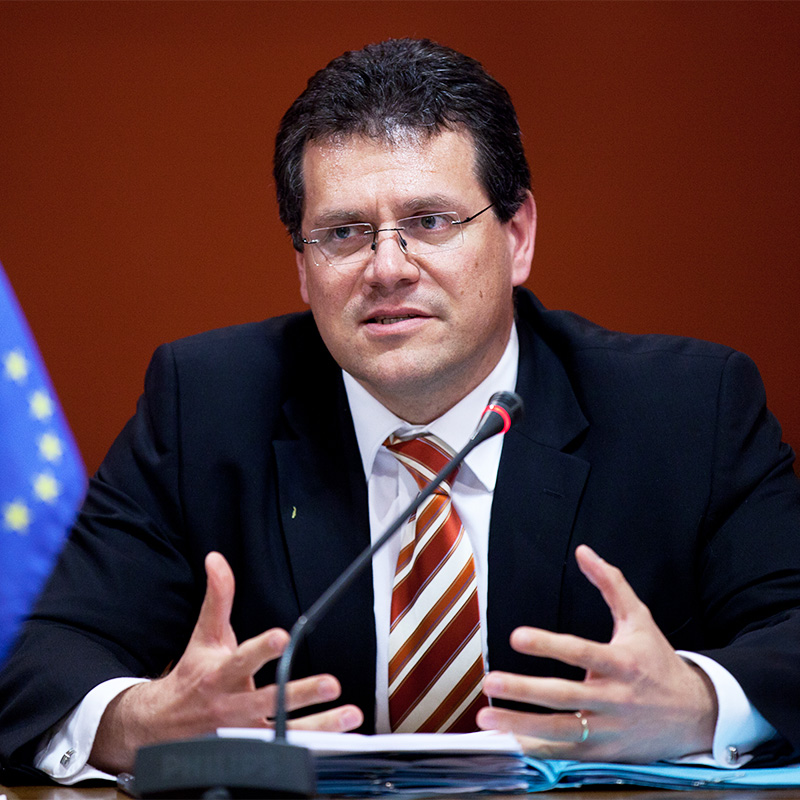European Commission executive vice president Maroš Šefcovic (Image credit: Ernests Dinka).
06 Oct 2023 — The European Commission (EC) has revealed its intention to publish only one of four promised proposals on animal welfare in this political term in a move that NGOs warn could end in democratic failure. Direct democratic engagement shows that citizens want reform, with five of the ten successful European Citizens’ Initiatives (ECIs) concerning animal welfare.
EC executive vice president Maroš Šefčovič — the EU Commissioner leading the race to replace Frans Timmermans as leader of the EU Green Deal — confirmed this week his plans to deliver the proposal on the protection of animals during transport by December 2023. But he failed to clarify the timeline for the other three regulations: Kept Animals, Slaughter and Labelling.
Despite Šefčovič suggesting that the “Green Deal continues to thrive,” the European Environmental Bureau (EEB) accused the Slovak politician of “dodging questions” on animal welfare, food and chemical legislation. The EEB says the delays raise concerns that revisions “may be abandoned entirely.”
The latest ECIs, End the Cage Age and Fur Free Europe, collected roughly 1.4 and 1.5 million signatures respectively, prompting the EC to commit to putting forward a legislative proposal by the end of 2023 to phase out the use of cages, which has not yet been delivered.
“Considering the timeline required and the fact that there is an election period in the process, we are now dealing with a very tight deadline,” Reineke Hameleers, CEO at Eurogroup for Animals, tells Food Ingredients First.
“Failing to uphold the wishes of 1.4 million citizens in this political term will be a democratic failure for this Commission. This full proposal was promised to citizens, yet we face ambiguity and silence at such a critical moment.”
Time for action?
During this week’s hearing at the European Parliament, Šefčovič repeated that the animal welfare proposals remain a priority for the upcoming months. But when questioned by several MEPs, he said that the work on the full legislation requires more assessment and dialogues.
“The current political climate is definitely at play — there is no denying that big agri-business is having its way,” says Hameleers.
“The issue of cost comes up often, yet inaction comes at a cost too. The real cost to citizens, consumers and farmers is inaction. Our animal farming practices take a heavy toll on the environment and climate. As the environment suffers and disastrous climate events become the norm, citizens pay the price.”
Eurogroup for Animals continues to call for the publication of the full proposals, which were committed by the EC as part of the Farm to Fork Strategy. The NGO still expects an official response to the Fur Free Europe ECI by mid-December.
Animal transport reform
The EC is expected to deliver its proposal on the protection of animals during transport this term. But animal protection groups continue to question the depth of the reform that can be expected.
“What transpired from the impact assessment is a very weak proposal,” says Hameleers.
“We hope to see a ban on live exports, shorter journey times for live transport within the EU, a ban on transporting animals in extreme weather conditions and on transporting unweaned and pregnant animals.”
“Transporting live animals should also gradually be replaced by more trade in meat and carcasses.”
For shorter journeys, it is also important to improve existing conditions by providing more space for the animals, access to water and feed and comfortable bedding,
Unprotected animals
While Eurogroup for Animals welcomes the publication of a proposal to revise the Transport Regulation, it reiterates that delivering only part of the expected legislation does not align with citizens’ wishes and the numerous EFSA opinions that have demonstrated the urgent need to update the 15-year-old animal welfare rules.
In September, animal protection lobbyists called on the EC to finally deliver on its promise to revise its animal welfare legislation before the end of the year in line with the latest science and societal expectations. EC President Ursula von der Leyen faced criticism, including from several MEPs, after failing to address animal rights in her State of the European Union speech.
Meanwhile, numerous sentient creatures, like octopuses, remain entirely unprotected under EU law. Animal rights groups are campaigning against Nueva Pescanova’s plans to build the world’s first industrial octopus farm in Gran Canaria, Canary Islands, Spain.
The company told us that its project “fully complies with the guidelines issued by the EC for a balanced convergence between the growth of the aquaculture sector and the green transition,” adding that it has achieved “optimal conditions for octopus culture that ensure their well-being.”
To mark World Octopus Day (October 8), 76 NGOs, scientific experts and public figures worldwide have urged the Canary Islands government to reject the plans.
By Joshua Poole
To contact our editorial team please email us at
editorial@cnsmedia.com
If you found this article valuable, you may wish to receive our newsletters.
Subscribe now to receive the latest news directly into your inbox.
